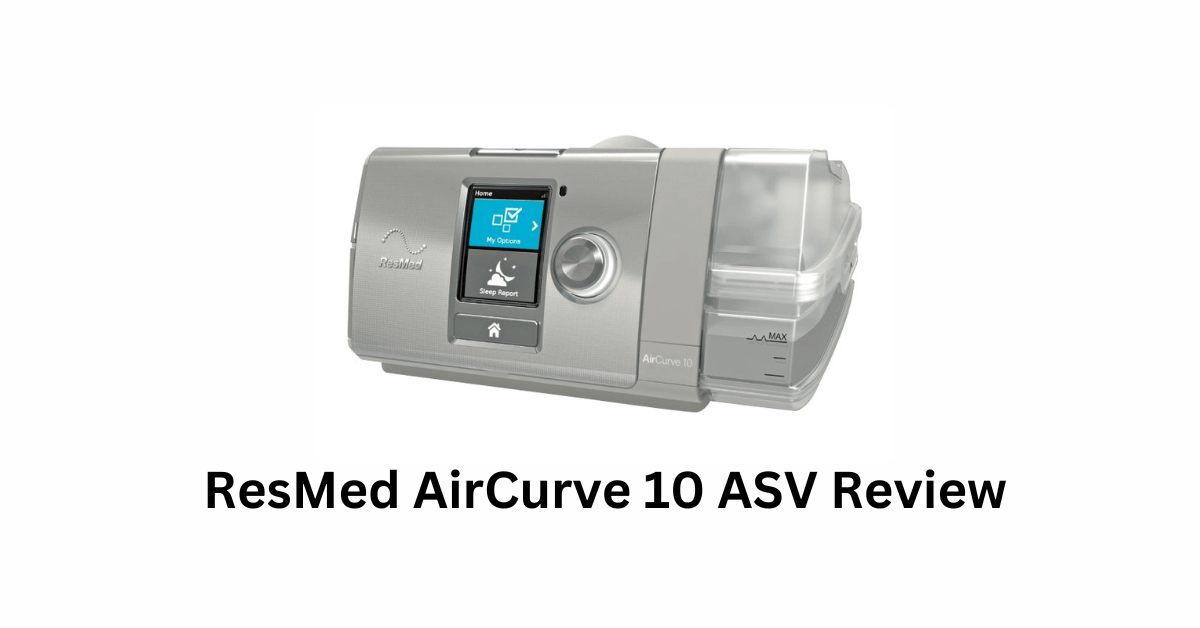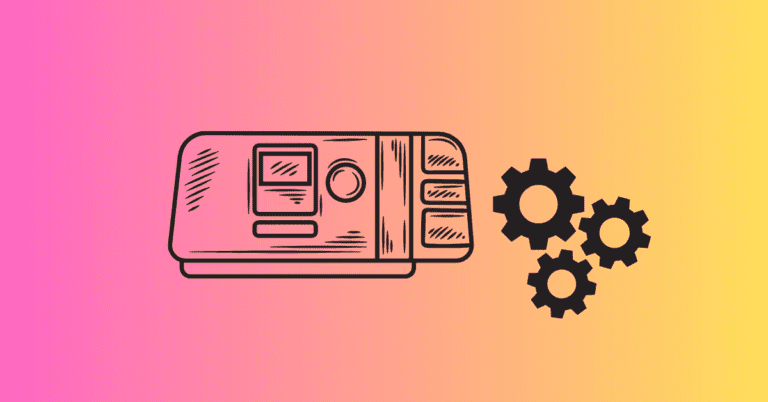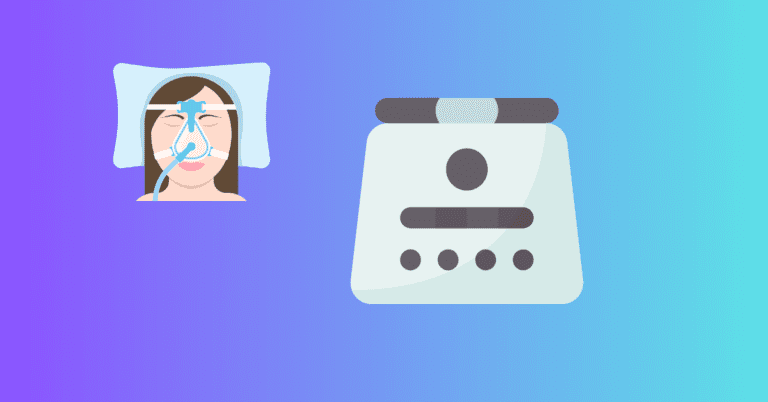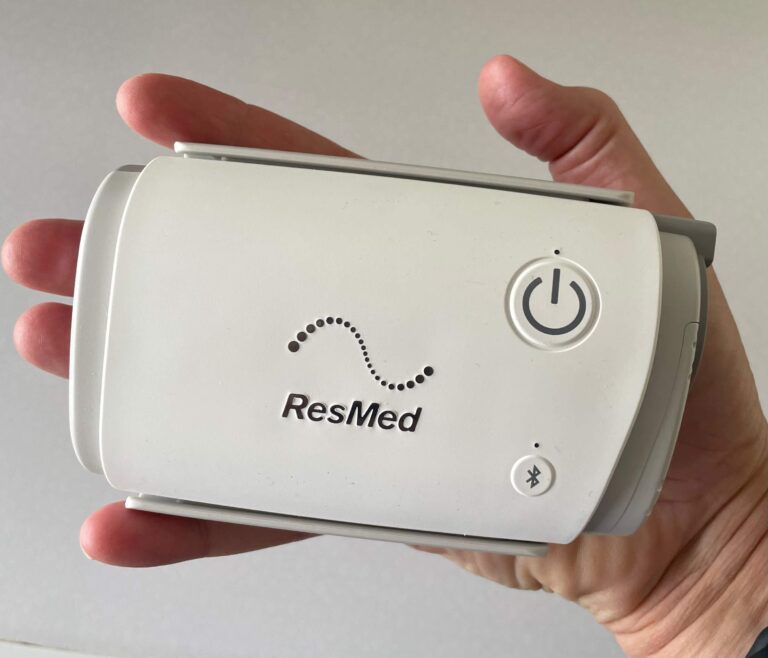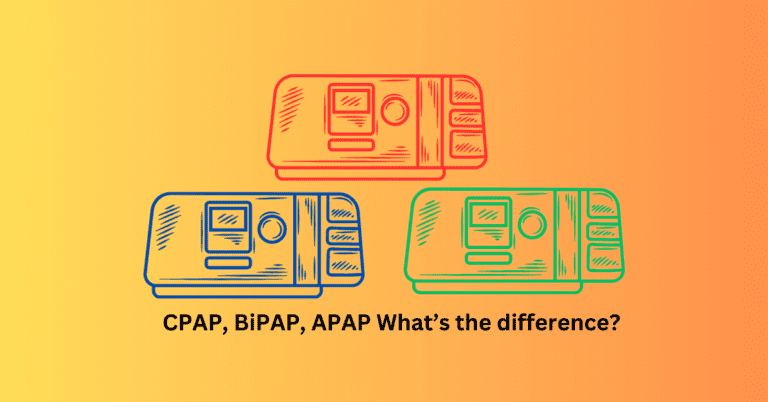ResMed AirCurve 10 ASV Review: Is it the Machine To Help You?
Jeremy Smith is a long-term CPAP user and sleep apnea advocate. After being diagnosed with severe obstructive sleep apnea, he created ByJeremySmith.com to help others navigate CPAP therapy through personal stories, gear reviews, and practical advice.
“This post contains affiliate links. I may earn a commission if you buy through these links, at no extra cost to you. Read my Disclaimer for more details.”
In this review, I’ll be looking at the ResMed AirCurve 10 ASV which is highly specialized for treating those of us diagnosed with central or complex mixed sleep apnea. Also, you might be prescribed an ASV machine if you have Cheyne-Stokes respiration.
As I have obstructive sleep apnea, I don’t need an ASV machine, but I do own 2 ResMed Machines (1 is for travel) and I love them both.

But first, if you want to understand the science behind, ASV you can refer to this article I wrote.
What Is the ResMed AirCurve 10 ASV?
As I mentioned in the introduction, the ResMed AirCurve 10 ASV is a specialized BiPAP (bilevel positive airway pressure) machine designed specifically for treating central sleep apnea, Cheyne-Stokes respiration, and complex sleep apnea syndrome.
Unlike traditional CPAP or BiPAP machines, which deliver fixed or manually adjusted pressure, ASV technology automatically adapts to your unique breathing patterns in real-time. It’s smart but it comes at a price.
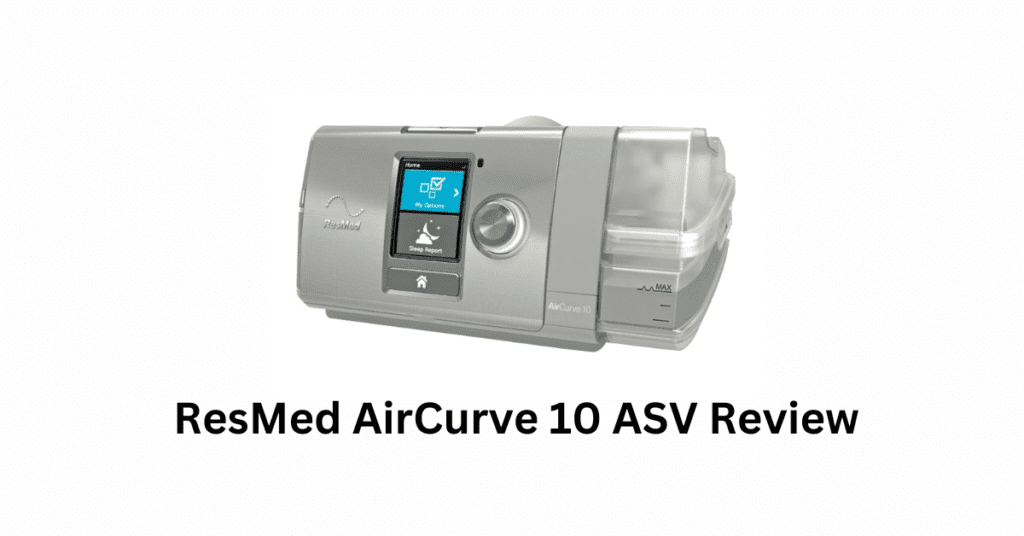
Who Is It For?
- People with central sleep apnea (CSA) – where the brain fails to send proper signals to breathe
- People with complex sleep apnea syndrome (CompSAS) – a mix of obstructive and central sleep apnea
- People with Cheyne-Stokes respiration (CSR) – a breathing pattern often seen in heart failure patients
- Those who have failed standard CPAP or BiPAP therapy
This is not a typical CPAP machine. If you only have obstructive sleep apnea (OSA) like me, a CPAP or regular BiPAP may be a better (and more affordable) option.
Key Features of the ResMed AirCurve 10 ASV
1. Adaptive Servo-Ventilation (ASV) Algorithm
This is the star feature of the AirCurve 10 ASV. The machine continuously monitors your breathing and adjusts pressure levels on a breath-by-breath basis. This ensures:
- Breathing stabilization – Prevents pauses in breathing (apneas) by detecting irregular patterns.
- Customized support – The machine increases pressure when needed and lowers it when breathing normalizes.
- Better comfort – Avoids over-pressurization, which can be a common issue with standard BiPAP therapy.
2. Auto-adjusting Pressure for Both Inhalation & Exhalation
Unlike fixed-pressure BiPAP machines, the AirCurve 10 ASV automatically adjusts both inspiratory positive airway pressure (IPAP) and expiratory positive airway pressure (EPAP) to maintain a steady breathing pattern.
3. Built-in HumidAir™ Heated Humidifier
Dryness and nasal irritation can be major issues with sleep therapy. The built-in heated humidifier helps prevent these by adding moisture to the air. You can also use ClimateLineAir™ heated tubing for even better humidity control.
4. Quiet Operation (27 dBA)
At just 27 decibels, this machine is whisper-quiet. For comparison:
- A typical CPAP machine runs at 30-32 dBA.
- Normal breathing is around 25 dBA.
- A quiet library is about 30 dBA.
If you or your partner are light sleepers, this machine won’t disturb your rest.
5. Easy-to-Use LCD Display
The bright color LCD screen and intuitive menu make adjusting settings simple. Even if you’re not tech-savvy, you’ll find it easy to navigate.
6. ResMed AirView™ Remote Monitoring
Your doctor or sleep therapist can remotely access your therapy data via AirView™, ResMed’s cloud-based monitoring system. This helps fine-tune settings and ensures compliance.
7. Auto Start & Stop
The machine automatically starts therapy when you put on your mask and stops when you remove it—no need to press buttons in the dark.
Performance & Comfort
✅ Breath-by-Breath Adjustments for Maximum Comfort
One of the biggest advantages of the AirCurve 10 ASV is how smoothly it adapts to your unique breathing cycle. Unlike traditional BiPAP therapy, which can sometimes feel forceful or unnatural, ASV technology provides a much more responsive and natural breathing experience.
Many users (including myself) have noted that this is one of the few machines that actually feels like it’s “breathing with you.” That’s a big deal, especially if you’ve struggled with fixed-pressure therapy in the past.
✅ Effective Treatment for Central Sleep Apnea
If you have CSA or Cheyne-Stokes respiration, this machine does a phenomenal job of preventing apneas. It actively corrects irregular breathing patterns, something standard CPAPs simply cannot do.
✅ Minimal Noise & Disruption
With a 27 dBA sound level, this is one of the quietest ASV machines available. If noise has been an issue with past CPAP/BiPAP machines, you’ll appreciate how silent this one is.
✅ Great for Travel (But Requires a Power Source)
The AirCurve 10 ASV is compact and lightweight. However, if you plan to use it for camping or off-grid travel, you’ll need a DC converter or external battery like the ResMed Power Station II.
❌ Not Covered by Insurance for Everyone
ASV therapy is more expensive than traditional CPAP, and many insurance companies require strict documentation to cover it. You’ll likely need:
- A sleep study confirming central sleep apnea.
- A CPAP/BiPAP trial showing it didn’t work for you.
- A doctor’s prescription specifically for ASV therapy.
Check with your insurance provider before purchasing.
Pros & Cons of the ResMed AirCurve 10 ASV
✅ Pros
✔️ Best-in-class ASV technology for central sleep apnea and complex sleep apnea
✔️ Fully automated pressure adjustments for maximum comfort and effectiveness
✔️ Extremely quiet operation (27 dBA)
✔️ Built-in humidifier with optional heated tubing
✔️ Auto start/stop feature for convenience
✔️ AirView™ remote monitoring for easy compliance tracking
❌ Cons
❌ Expensive – ASV therapy is not cheap ($3,500-$5,000 without insurance)
❌ Requires strict medical criteria for insurance coverage
❌ Not ideal for obstructive sleep apnea – If you only have OSA, a CPAP or BiPAP is a better choice
❌ Battery life limitations – Not as travel-friendly as CPAP devices
Price & Where to Buy
The ResMed AirCurve 10 ASV typically costs between $3,500 and $5,000, depending on where you buy it. Since it’s a prescription-only device, you’ll need a valid script from your doctor.
If you’re buying out-of-pocket, consider looking for refurbished or gently used models from reputable sources to save money.
Final Verdict: Is the ResMed AirCurve 10 ASV Worth It?
If you have central sleep apnea, complex sleep apnea, or Cheyne-Stokes respiration, the ResMed AirCurve 10 ASV is hands-down one of the best ASV machines on the market.
Its adaptive servo-ventilation technology makes a huge difference in comfort, breathing stability, and overall therapy success.
However, it’s not for everyone. If you only have obstructive sleep apnea, a traditional CPAP or BiPAP is a better (and more affordable) choice. Also, be aware that insurance coverage for ASV therapy is tricky, so check with your provider before buying.
Overall Rating: 9.5/10
🌟 Best for: Central Sleep Apnea, Complex Sleep Apnea, Cheyne-Stokes Respiration
🚫 Not ideal for: Simple Obstructive Sleep Apnea, people on a tight budget
Disclaimer: The content on this blog is for informational and educational purposes only and is not a substitute for professional medical advice. Always speak with your doctor or sleep specialist before starting, stopping, or changing any treatment or therapy related to sleep apnea or CPAP use.
